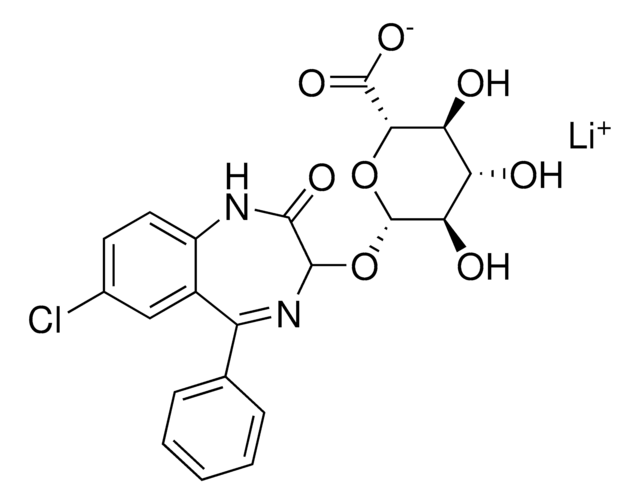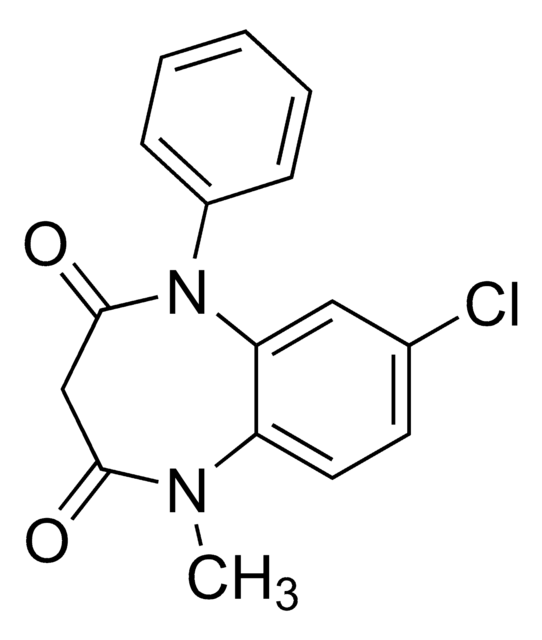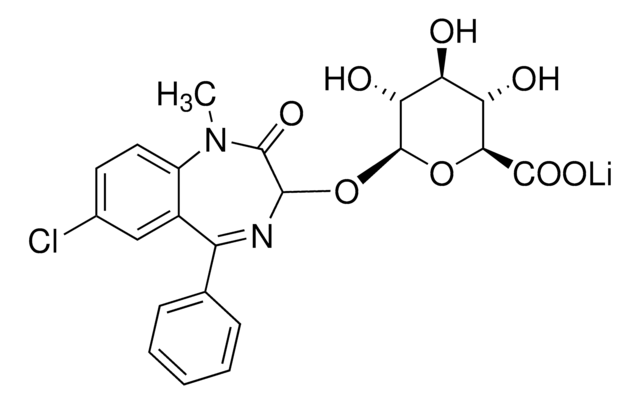L-021
Lorazepam glucuronide solution
100 μg/mL in acetonitrile: water (1:1), ampule of 1 mL, certified reference material, Cerilliant®
About This Item
Recommended Products
grade
certified reference material
form
liquid
feature
Snap-N-Spike®/Snap-N-Shoot®
packaging
ampule of 1 mL
manufacturer/tradename
Cerilliant®
drug control
Narcotic Licence Schedule B (Switzerland)
concentration
100 μg/mL in acetonitrile: water (1:1)
technique(s)
gas chromatography (GC): suitable
liquid chromatography (LC): suitable
application(s)
clinical testing
format
single component solution
storage temp.
−20°C
SMILES string
O[C@@H]1[C@@H](O)[C@H](OC2N=C(c3ccccc3Cl)c4cc(Cl)ccc4NC2=O)O[C@@H]([C@H]1O)C(O)=O
InChI
1S/C21H18Cl2N2O8/c22-8-5-6-12-10(7-8)13(9-3-1-2-4-11(9)23)25-19(18(29)24-12)33-21-16(28)14(26)15(27)17(32-21)20(30)31/h1-7,14-17,19,21,26-28H,(H,24,29)(H,30,31)/t14-,15-,16+,17-,19?,21-/m0/s1
InChI key
IWOJSSFCRQKNKN-IFBJMGMISA-N
General description
Legal Information
related product
Signal Word
Danger
Hazard Statements
Precautionary Statements
Hazard Classifications
Acute Tox. 4 Oral - Eye Irrit. 2 - Flam. Liq. 2
Storage Class Code
3 - Flammable liquids
WGK
WGK 2
Flash Point(F)
55.4 °F - closed cup
Flash Point(C)
13 °C - closed cup
Certificates of Analysis (COA)
Search for Certificates of Analysis (COA) by entering the products Lot/Batch Number. Lot and Batch Numbers can be found on a product’s label following the words ‘Lot’ or ‘Batch’.
Already Own This Product?
Find documentation for the products that you have recently purchased in the Document Library.
Protocols
Optimize β-glucuronidase hydrolysis for glucuronide metabolite analysis considering factors like time, temperature, pH, and enzyme concentration.
Optimize β-glucuronidase hydrolysis for glucuronide metabolite analysis considering factors like time, temperature, pH, and enzyme concentration.
Optimize β-glucuronidase hydrolysis for glucuronide metabolite analysis considering factors like time, temperature, pH, and enzyme concentration.
Optimize β-glucuronidase hydrolysis for glucuronide metabolite analysis considering factors like time, temperature, pH, and enzyme concentration.
Our team of scientists has experience in all areas of research including Life Science, Material Science, Chemical Synthesis, Chromatography, Analytical and many others.
Contact Technical Service









